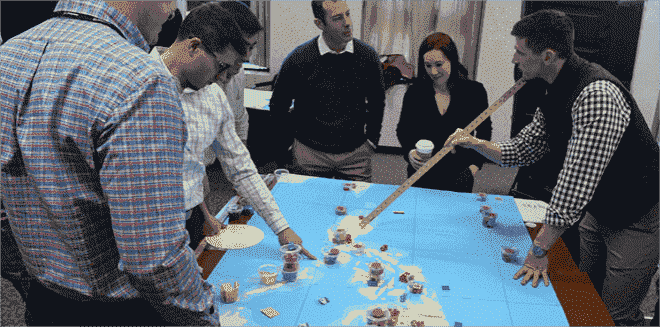How to apply wargaming to intelligence?
A wargame is a strategy game in which two or more players command opposing armed forces in a realistic simulation of an armed conflict. Wargaming may be played for recreation, to train military officers in the art of strategic thinking, or to study the nature of potential conflicts. Many wargames recreate specific historic battles, and can cover either whole wars, or any campaigns, battles, or lower-level engagements within them. Many simulate land combat, but there are wargames for naval and air combat as well.
Generally, activities where the participants actually perform mock combat actions (e.g. friendly warships firing dummy rounds at each other) are not considered wargames. Some writers may refer to a military's field training exercises as "live wargames", but certain institutions such as the US Navy do not accept this. Likewise, activities like paintball are sports rather than wargames. Wargames are a mental activity.
How to implement wargaming?
The implementation of wargaming is not really complicated. A common misconception is that it requires complex computer programs, detailed map-computing systems, and intricate rules. If this is the case, wargaming does not meet the fast-paced needs of intelligence analysis. In fact, this is not true of all wargames.
At its simplest, a wargame requires only pairs of players representing different people or organizations and a referee to determine the sequence and outcome of actions. A slightly more complex game requires only a map, pieces representing the various forces, and some simple rules. We can implement a wargame in a conference room, or around a table, and complete it in one to two hours. It may seem like a long time to commit to a wargame, but most analysts have experienced attending long meetings without any useful results at the end.

How to apply wargaming to intelligence?
1. Staff training
Diversity for intelligence analysts is the key to avoiding blind spots and preventing groupthink. The focus of building diverse teams is to bring in analysts with no military experience. But military intelligence leaders cannot accept that these analysts have no knowledge of military operations. Wargaming, as part of new analyst training, can help analysts expand their structure in ways that lectures and readings cannot, by focusing them on factors that influence realistic military decisions, such as maneuver, firepower, and logistics.
2. Daily analytical work
Analysts can also add military chess to their arsenal of tools to use in their daily work. As mentioned earlier, the implementation of a wargame exercise is not complicated. Analysts can examine specific battles, campaigns or wars in a structured and dynamic manner around a map in a conference room. The insights gained through the use of wargaming can help guide intelligence gathering or identify new analytical issues.
3. Interagency cooperation
On a larger scale, wargaming can be a key enabler of mutual cooperation within the intelligence community. Intelligence analysts can build networks of peers and regularly communicate results to each other in a community of common interest. This is important, but the former needs to be driven by the analysts themselves, and the latter is often difficult to achieve. Large-scale, cross-agency chess can bring analysts together for a few days to conduct in-depth rollout activities. During this time they are able to improve mutual understanding, discuss existing intelligence reports and apparent intelligence gaps, and explore various avenues of analysis. This experience helps foster deep and long-term relationships between agencies.
【Web Intelligence Monitoring】●Advantages of open source intelligence
【Dark Web】●5 Awesome Dark Web Links
銆怤etwork Security銆戔棌9 popular malicious Chrome extensions
【Open Source Intelligence】●10 core professional competencies for intelligence analysts
【News】●AI-generated fake image of Pentagon explosion goes viral on Twitter
銆怰esources銆戔棌The Achilles heel of AI startups: no shortage of money, but a lack of training data
銆怤ews銆戔棌Access control giant hit by ransom attack, NATO, Alibaba, Thales and others affected
【Artificial Intelligence】●Advanced tips for using ChatGPT-4



